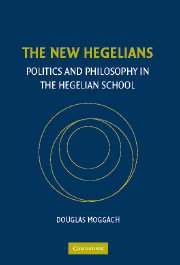Book contents
- Frontmatter
- Contents
- Acknowledgements
- Contributors
- Introduction: Hegelianism, Republicanism, and Modernity
- 1 Eduard Gans on Poverty and on the Constitutional Debate
- 2 Ludwig Feuerbach's Critique of Religion and the End of Moral Philosophy
- 3 The Symbolic Dimension and the Politics of Left Hegelianism
- 4 Exclusiveness and Political Universalism in Bruno Bauer
- 5 Republican Rigorism and Emancipation in Bruno Bauer
- 6 Edgar Bauer and the Origins of the Theory of Terrorism
- 7 Ein Menschenleben: Hegel and Stirner
- 8 ‘The State and I’: Max Stirner's Anarchism
- 9 Engels and the Invention of the Catastrophist Conception of the Industrial Revolution
- 10 The Basis of the State in the Marx of 1842
- 11 Marx and Feuerbachian Essence: Returning to the Question of ‘Human Essence’ in Historical Materialism
- 12 Freedom and the ‘Realm of Necessity’
- 13 Work, Language, and Community: A Response to Hegel's Critics
- Bibliography
- Index
13 - Work, Language, and Community: A Response to Hegel's Critics
Published online by Cambridge University Press: 22 August 2009
- Frontmatter
- Contents
- Acknowledgements
- Contributors
- Introduction: Hegelianism, Republicanism, and Modernity
- 1 Eduard Gans on Poverty and on the Constitutional Debate
- 2 Ludwig Feuerbach's Critique of Religion and the End of Moral Philosophy
- 3 The Symbolic Dimension and the Politics of Left Hegelianism
- 4 Exclusiveness and Political Universalism in Bruno Bauer
- 5 Republican Rigorism and Emancipation in Bruno Bauer
- 6 Edgar Bauer and the Origins of the Theory of Terrorism
- 7 Ein Menschenleben: Hegel and Stirner
- 8 ‘The State and I’: Max Stirner's Anarchism
- 9 Engels and the Invention of the Catastrophist Conception of the Industrial Revolution
- 10 The Basis of the State in the Marx of 1842
- 11 Marx and Feuerbachian Essence: Returning to the Question of ‘Human Essence’ in Historical Materialism
- 12 Freedom and the ‘Realm of Necessity’
- 13 Work, Language, and Community: A Response to Hegel's Critics
- Bibliography
- Index
Summary
Steven Smith's book Hegel's Critique of Liberalism begins with a description of contemporary liberalism that bears a striking resemblance to Herbert Marcuse's description of Hegel's state. According to Smith, the new liberal paradigm accepts individual autonomy as a natural datum and expects society to provide a framework of rules protecting the individual's right to pursue an individually chosen life-plan. Social institutions remain neutral to all substantive notions of the human good while providing equal protection of the law to everyone's interests. Herbert Marcuse's interpretation of Hegel reads like a pessimistic version of the same liberal paradigm. According to Marcuse, Hegel acknowledges individual freedom as a value that society must respect, protect, and support. Yet Hegel also recognises the inevitable destructiveness of competing individual interests. Hegel's answer, as Marcuse understands it, is a strong sovereign state imposing restraints on the free play of individuality while upholding and protecting the rights of individual freedom. Marcuse criticises this approach because the unity imposed by the state remains detached from the real life of the people. The restraint that keeps them from damaging the interests of others operates as an external force, not as something intrinsic to their own life.
This encounter between Marcuse and the liberal paradigm raises two questions: Why must the principle that unifies society become intrinsic to the life of its individual citizens; and how can this be accomplished.
- Type
- Chapter
- Information
- The New HegeliansPolitics and Philosophy in the Hegelian School, pp. 275 - 300Publisher: Cambridge University PressPrint publication year: 2006



